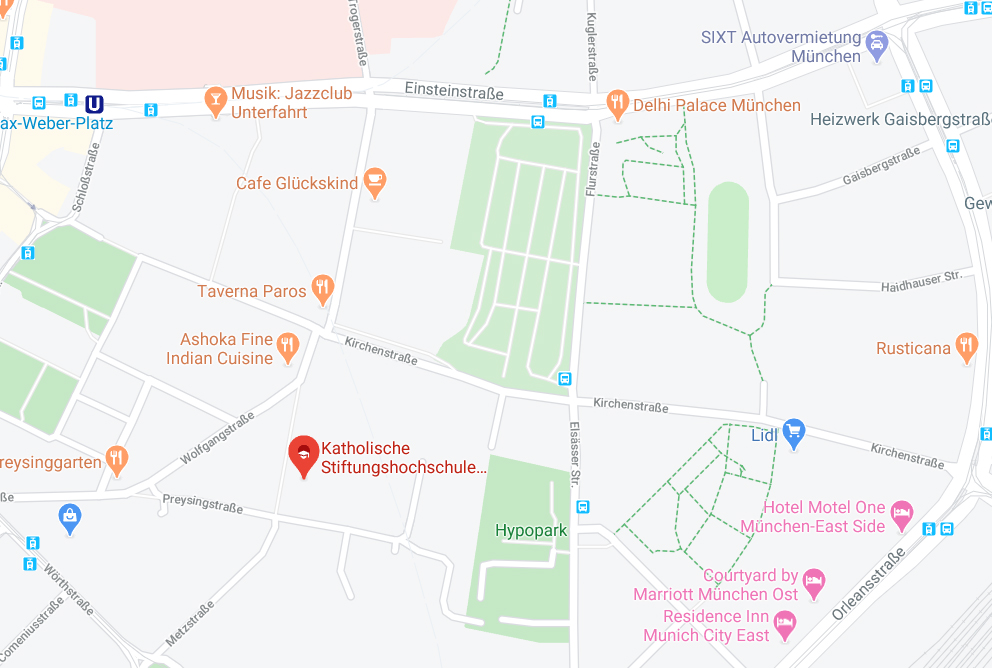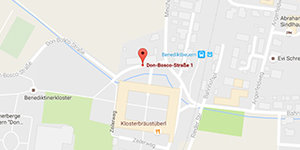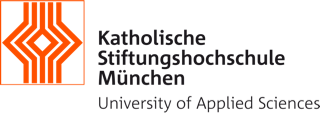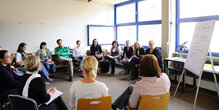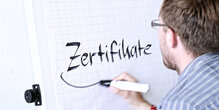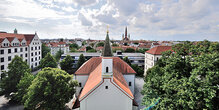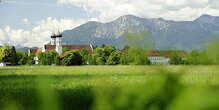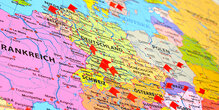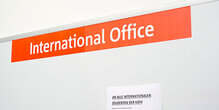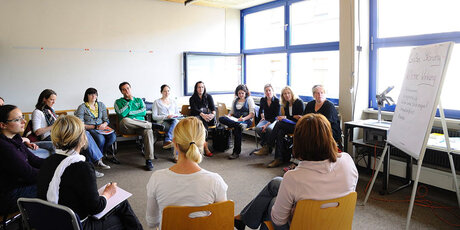Nursing Education (B.A.)
Study location
Munich
Faculty
Healthcare and Nursing
Dean of the Faculty
Prof. Dr. Anita Hausen
Academic degree
Bachelor of Arts (B.A.)
Start of the degree programme
winter semester
Places on the course
25
Standard period of study
7 semesters (including 1 practical semester)
Application period
online 01.05. - 15.07.2023
Profile of Nursing Education
The Katholische Stiftungshochschule München (KSH) University of Applied Sciences has offered the Bachelor's degree programme in Nursing Education since 2005. It is a scientific and practice-oriented university degree programme which conveys professional competence for fields of activity within nursing education.
The students are supported in terms of fostering full character development. Upon successful completion of the degree programme, you are able to develop an independent attitude to professional teaching activities, based on a critically reflected set of fundamental values. As a future educator for the nursing professions, you are thus prepared for broad-based teaching.
Structure of the curriculum
With the degree in Nursing Education (B.A.), you are able to independently and competently handle tasks in the teaching and vocational training sector, and take on roles related to apprenticeships, advanced and further training, as well as in the organisation of educational institutions and consulting.
The standard period of study is 7 semesters, of which one semester is a practical semester. The degree programme culminates in the awarding of a Bachelor of Arts (B.A.) degree in Nursing Education. The workload per semester is 30 ECTS credit points (CP). The degree programme has a modular structure.
The degree programme in nursing education is divided into the following segments:
Segment I: 1st - 4th semester
- The first part of the course conveys basic educational skills. Until the end of the 2nd semester, there is the option to change to the Nursing Management degree programme.
Segment II: 5th semester (practical semester)
Segment III: 6th - 7th semester
- This segment covers advanced, project-oriented modules in the subject and the compulsory elective modules, with particular emphasis on using the Skills and Simulation Laboratory at our faculty.
- A Bachelor's thesis must be completed in the third segment.
Prospects & perspectives
Nursing educators are not only in demand at vocational schools (Berufsfachschulen) in the healthcare sector, and institutes for advanced and further training. There are diverse career options in patient education, health education at health insurance and insurance companies, at business consulting firms, academies, publishers, etc. You can also work as a freelancer or pursue a scientific career.
Tasks and roles of future nursing educators:
- Nursing education
- Advanced and further training (teaching and training)
- Supervision and training of interns, nursing assistants, etc.
- Performance planning, consulting and evaluation (as a nursing expert)
- Analysis/evaluation activities (as a nursing expert)
- Health promotion and health education
- Scientific career
- Publishing activity (copy editing/proofreading)
- Business consulting (development of training courses)
The degree in nursing education is recognised in Bavaria as advanced or further training for the practical instruction of geriatric nursing, and as an additional vocational pedagogical qualification for practical nursing instruction. The degree simultaneously grants state recognition as a leader of inpatient facilities, insofar as proof can be provided that an internship of at least 40 hours has been completed in an inpatient facility for nursing and geriatric care.
Applications & admission
The degree programme in nursing education offers 25 places on the course.
Admission requirements:
1. Proof of one of the following higher education entrance qualifications:
- a general or a specialist (subject-specific) university entrance qualification
- a university of applied sciences entrance qualification or a specialist (subject-specific) university of applied sciences entrance qualification
- a general or specialist (subject-specific) university entrance for professionals with vocational qualifications
2. Proof of one of the following completed vocational training courses:
- nursing, paediatric nursing
- midwifery
- geriatric nursing
- social care worker
- or equivalent vocational training completed in another country
Admission requirements for applicants eligible through vocational qualifications (in accordance with Art. 45 of the Bavarian Higher Education Act (BayHSchG) and Sections 29 and 30 of the Qualification Regulations)
- completed qualifying vocational training in nursing and
- at least 3 years of professional activity within a field of nursing
Please note that applications are only possible online and during the application period. Application period: annually from the beginning of May until mid-June. If you have a foreign higher education entrance qualification or a foreign university degree, and wish to apply for a Bachelor's degree programme at the KSH Munich, you must first have your foreign certificates checked by the external service provider uni-assist e.V.. The pre-evaluation documentation obtained from uni-assist e.V. must be submitted together with the application documents. For more information, please see the section on Information for Foreign Applicants.
Nursing Education (B.A.)
Study location
Munich
Faculty
Healthcare and Nursing
Dean of the Faculty
Prof. Dr. Anita Hausen
Academic degree
Bachelor of Arts (B.A.)
Start of the degree programme
winter semester
Places on the course
25
Standard period of study
7 semesters (including 1 practical semester)
Application period
online 01.05. - 15.07.2023
Profile of Nursing Education
The Katholische Stiftungshochschule München (KSH) University of Applied Sciences has offered the Bachelor's degree programme in Nursing Education since 2005. It is a scientific and practice-oriented university degree programme which conveys professional competence for fields of activity within nursing education.
The students are supported in terms of fostering full character development. Upon successful completion of the degree programme, you are able to develop an independent attitude to professional teaching activities, based on a critically reflected set of fundamental values. As a future educator for the nursing professions, you are thus prepared for broad-based teaching.
Structure of the curriculum
With the degree in Nursing Education (B.A.), you are able to independently and competently handle tasks in the teaching and vocational training sector, and take on roles related to apprenticeships, advanced and further training, as well as in the organisation of educational institutions and consulting.
The standard period of study is 7 semesters, of which one semester is a practical semester. The degree programme culminates in the awarding of a Bachelor of Arts (B.A.) degree in Nursing Education. The workload per semester is 30 ECTS credit points (CP). The degree programme has a modular structure.
The degree programme in nursing education is divided into the following segments:
Segment I: 1st - 4th semester
- The first part of the course conveys basic educational skills. Until the end of the 2nd semester, there is the option to change to the Nursing Management degree programme.
Segment II: 5th semester (practical semester)
Segment III: 6th - 7th semester
- This segment covers advanced, project-oriented modules in the subject and the compulsory elective modules, with particular emphasis on using the Skills and Simulation Laboratory at our faculty.
- A Bachelor's thesis must be completed in the third segment.
Prospects & perspectives
Nursing educators are not only in demand at vocational schools (Berufsfachschulen) in the healthcare sector, and institutes for advanced and further training. There are diverse career options in patient education, health education at health insurance and insurance companies, at business consulting firms, academies, publishers, etc. You can also work as a freelancer or pursue a scientific career.
Tasks and roles of future nursing educators:
- Nursing education
- Advanced and further training (teaching and training)
- Supervision and training of interns, nursing assistants, etc.
- Performance planning, consulting and evaluation (as a nursing expert)
- Analysis/evaluation activities (as a nursing expert)
- Health promotion and health education
- Scientific career
- Publishing activity (copy editing/proofreading)
- Business consulting (development of training courses)
The degree in nursing education is recognised in Bavaria as advanced or further training for the practical instruction of geriatric nursing, and as an additional vocational pedagogical qualification for practical nursing instruction. The degree simultaneously grants state recognition as a leader of inpatient facilities, insofar as proof can be provided that an internship of at least 40 hours has been completed in an inpatient facility for nursing and geriatric care.
Applications & admission
The degree programme in nursing education offers 25 places on the course.
Admission requirements:
1. Proof of one of the following higher education entrance qualifications:
- a general or a specialist (subject-specific) university entrance qualification
- a university of applied sciences entrance qualification or a specialist (subject-specific) university of applied sciences entrance qualification
- a general or specialist (subject-specific) university entrance for professionals with vocational qualifications
2. Proof of one of the following completed vocational training courses:
- nursing, paediatric nursing
- midwifery
- geriatric nursing
- social care worker
- or equivalent vocational training completed in another country
Admission requirements for applicants eligible through vocational qualifications (in accordance with Art. 45 of the Bavarian Higher Education Act (BayHSchG) and Sections 29 and 30 of the Qualification Regulations)
- completed qualifying vocational training in nursing and
- at least 3 years of professional activity within a field of nursing
Please note that applications are only possible online and during the application period. Application period: annually from the beginning of May until mid-June. If you have a foreign higher education entrance qualification or a foreign university degree, and wish to apply for a Bachelor's degree programme at the KSH Munich, you must first have your foreign certificates checked by the external service provider uni-assist e.V.. The pre-evaluation documentation obtained from uni-assist e.V. must be submitted together with the application documents. For more information, please see the section on Information for Foreign Applicants.
